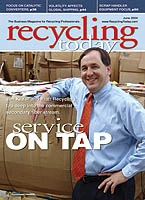California Wraps It Up
Applications for the 2004 Waste Reduction Awards Program (WRAP) opened in April for California businesses and nonprofits demonstrating exemplary resource conservation by reducing waste in the workplace. In its 12th year, the awards program is sponsored by the California Integrated Waste Management Board to recognize businesses statewide for their commitment to environmental protection.
WRAP applications are being accepted through June 30, 2004, with the winners to be announced in September. The application can be obtained online at www.ciwmb.ca.gov/WRAP/ or by contacting the board’s WRAP Program coordinator at wrap@ciwmb.ca.gov or at (916) 341-6604.
"Thousands of businesses in California are proving daily that good business practices and environmental considerations are not mutually exclusive," board chair Linda Moulton-Patterson says. "We urge every eligible business to apply for this year’s WRAP awards and to let us know about their outstanding efforts."
The WRAP award program was established in 1993 and honors California businesses and nonprofit organizations for leadership in waste reduction, waste prevention, recycling, reuse and buying recycled-content products.
Information on prior WRAP award winners statewide by county is available at the board’s Web site at www.ciwmb.ca.gov/WRAP/search.asp.
DELAWARE ISSUES RECYCLING GRANTS
The Delaware Department of Natural Resources and Environmental Control (DNREC) and the Governor’s Recycling Public Advisory Council have awarded $50,000 in Recycling Assistance Grants for Fiscal Year 2004. Seven proposals were approved for funding.
The city of New Castle and the town of Newport received the largest grant, which was $25,300. The two municipalities are working cooperatively to establish programs to handle residential yard waste, and Newport is also planning to implement curbside recycling for its residents.
Other projects receiving grants are the University of Delaware, which will conduct composting education in schools and other group settings; the city of Wilmington, which will conduct an assessment of the costs of implementing curbside recycling for all residents that receive trash pickup from the city; Delaware City, which will expand its subscription curbside recycling program to all interested residents of the city; Rehoboth Beach, which will make improvements to its existing beach and boardwalk recycling program; and Minorities in Agriculture, Natural Resources and Related Sciences, which will expand paper recycling at Delaware State University and conduct an environmental education campaign for students there.
"In keeping with the intent of the grant program, we tried to fund projects that will be sustainable over the long term and that have the potential to divert a lot of material from the waste stream," Paul Wilkinson, chairman of the Recycling Public Advisory Council, says.
Funds for the Recycling Assistance Grant program are subject to annual authorization by the General Assembly.

Explore the June 2004 Issue
Check out more from this issue and find your next story to read.
Latest from Recycling Today
- Reconomy brands receive platinum ratings from EcoVadis
- Sortera Technologies ‘owning and operating’ aluminum sorting solutions
- IDTechEx sees electric-powered construction equipment growth
- Global steel output recedes in November
- Fitch Ratings sees reasons for steel optimism in 2025
- P+PB adds new board members
- BlueScope, BHP & Rio Tinto select site for electric smelting furnace pilot plant
- Magnomer joins Canada Plastics Pact





